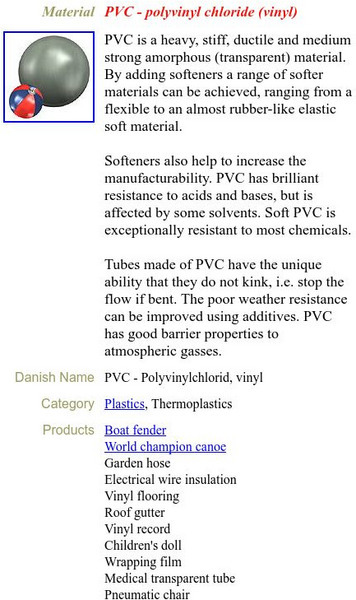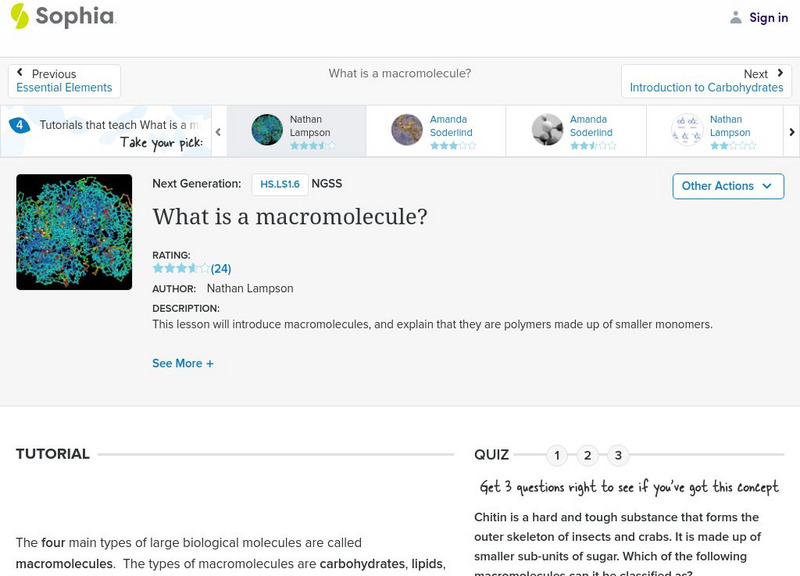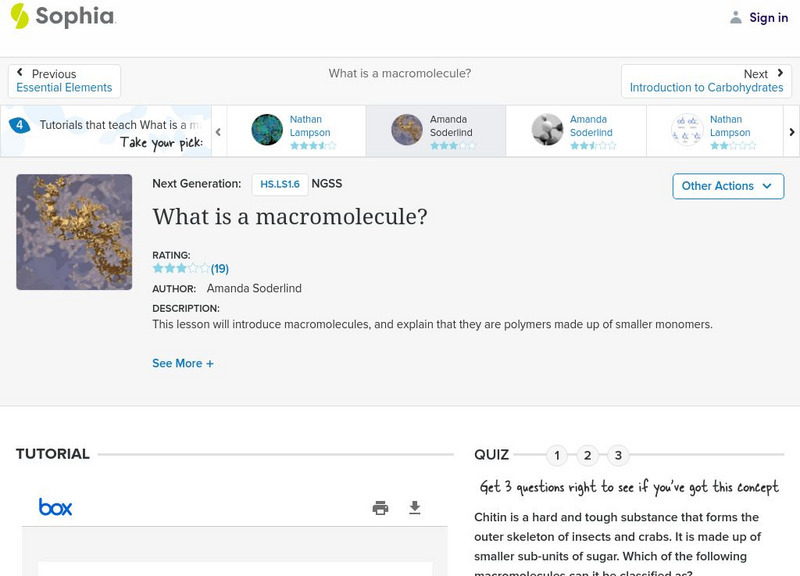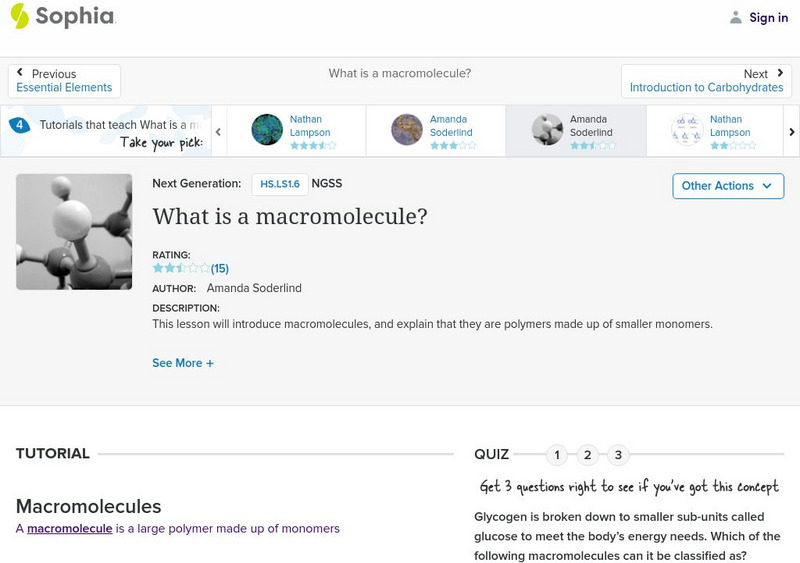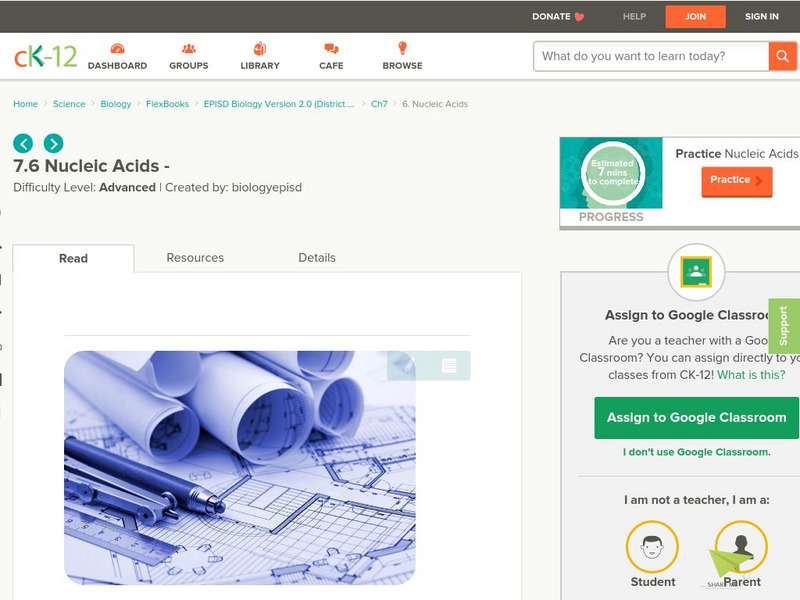Hi, what do you want to do?
Massachusetts Institute of Technology
Mit: Inventor of the Week: Roy J. Plunkett
Read about Roy Plunkett's invention, teflon, one of the best-known and most widely used polymers that was created by accident.
TeachEngineering
Teach Engineering: Silly Semi Solids
Groups of students make a polymer out of household items. They then experiment with the polymer to determine its various properties.
Famous Scientists
Famous Scientists: Stephanie Kwolek
Learn about the life and work of Stephanie Kwolekbest, known for inventing the first of a family of synthetic fibers of exceptional strength and stiffness.
Other
Design in Site: Polyvinylchloride
An overview of the polymer which includes an interesting segment on the production requirements.
Sophia Learning
Sophia: What Is a Macromolecule?: Lesson 2
This lesson will introduce macromolecules, and explain that they are polymers made up of smaller monomers. It is 2 of 4 in the series titled "What is a macromolecule?"
Sophia Learning
Sophia: What Is a Macromolecule?: Lesson 3
This lesson will introduce macromolecules, and explain that they are polymers made up of smaller monomers. It is 3 of 4 in the series titled "What is a macromolecule?"
Sophia Learning
Sophia: What Is a Macromolecule?: Lesson 4
This lesson will introduce macromolecules, and explain that they are polymers made up of smaller monomers. It is 4 of 4 in the series titled "What is a macromolecule?"
Sophia Learning
Sophia: What Is a Macromolecule?: Lesson 1
This lesson will introduce macromolecules, and explain that they are polymers made up of smaller monomers. It is 1 of 4 in the series titled "What is a macromolecule?"
Michigan State University
Michigan State University: Stereoisomerism in Polymers
Explanation of the various types of stereoisomers,with an isomer classification flowchart.
Other
Stanford University: Cellulose Nitrate
Background and chemical information on the precursor chemical to celluloid.
Other
Prince Edward Island: Behind the Eight Ball
Interesting historical article about the driving force behind the invention of celluloid.
TeachEngineering
Teach Engineering: Let the Blood Flow
Students work as biomedical engineers to find liquid solutions that can clear away polyvinyl acetate polymer "blood clots" in model arteries (made of clear, flexible tubing). Teams create samples of the "blood clot" polymer with...
National Institutes of Health
Ncbi: Amino Acids Are Linked by Peptide Bonds to Form Polypeptide Chains
Proteins are linear polymers formed by linking the a-carboxyl group of one amino acid to the a-amino group of another amino acid with a peptide bond. The formation of a dipeptide from two amino acids is accompanied by the loss of a water...
Khan Academy
Khan Academy: Macromolecules: Introduction to Macromolecules
An article introducing macromolecules. Learn about monomers and polymers and the processes that build them and break them down.
TeachEngineering
Teach Engineering: Preconditioning Balloons
Students use balloons (a polymer) to explore preconditioning a viscoelastic material behavior that is important to understand when designing biomedical devices. They improve their understanding of preconditioning by measuring the force...
TeachEngineering
Teach Engineering: Fun Look at Material Science
Students are introduced to the multidisciplinary field of material science. Through a class demo and PowerPoint presentation, they learn the basic classes of materials (metals, ceramics, polymers, composites) and how they differ from one...
TeachEngineering
Teach Engineering: Breaking Beams
Students learn about stress and strain by designing and building beams using polymer clay. They compete to find the best beam strength to beam weight ratio, and learn about the trade-offs engineers make when designing a structure.
Lawrence Berkeley National Laboratory
Berkeley Lab: Kevlar the Wonder Material
Very good site for low level information on polymers in general and kevlar in particular.
Practical Action
Practical Action: Plastics Challenge
This is a challenge for students to develop solutions to the problems caused by plastic waste globally. They will learn about how plastic waste impacts people around the world, the different types of plastic, how they are each used, how...
University of Pennsylvania
University of Pennsylvania: Solid State Chemistry: Describing Crystalline Solids
This site contains in-depth information on crystalline solids. Includes basic concepts, pictures, learning graphs, and useful tools.
Other
Chemical Heritage Foundation: Leo Hendrik Baekeland
Leo Hendrik Baekeland was the inventor of bakelite, the first completely synthetic plastic. Biographical information and photographs on this page.
CK-12 Foundation
Ck 12: Carbohydrates
[Free Registration/Login may be required to access all resource tools.] This activity covers the structure and function of carbohydrates. Students will learn about the different types of complex carbohydrates and how they are formed.
CK-12 Foundation
Ck 12: Proteins
[Free Registration/Login may be required to access all resource tools.] Students will learn about the structures and function of proteins and how we get protein in our diet.
CK-12 Foundation
Ck 12: Nucleic Acids
[Free Registration/Login may be required to access all resource tools.] Online activity covers the structure and function of nucleic acids. Students will learn about nucleotides, the different types of nitrogenous bases, and the...
Other popular searches
- Polymerase Chain Reaction
- Condensation Polymerization
- Polymers Plastics
- Monomers and Polymers
- Polymer Science
- Plastic Polymer
- Polymer Clay
- History of Polymers
- Monomers & Polymers
- Disposal of Polymers
- Making Polymers
- Uses of Polymers








